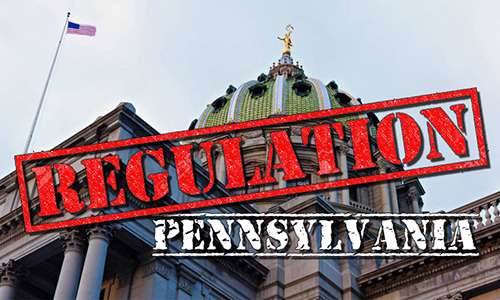Pennsylvania Gaming Control Board Issues Internet Gaming Advisory FAQ
In preparation for the rollout of authorized online gambling in Pennsylvania later this year, the state’s Gaming Control Board has issued a two-page advisory FAQ for the general public. The assembled collection of answers to 15 or so questions the GCB commonly receives, titled simply “Internet Gaming,” runs the gamut, from a basic explanation of what internet gaming is to a breakdown of where state-received revenue will be distributed.
Most of the information in the FAQ has long since been known, but a wrinkle or two have emerged. Perhaps the most curious is the revelation that the state plans to mandate the blocking of play by customers on licensed sites while those customers are inside one of the state’s casino.
 It’s technically doable, via the same geolocation protocols and services that effectively ban players from outside a state from being able to play on state-authorized sites. (Such geolocation services are already in use in Nevada, New Jersey, and Delaware, the three other US states where online gambling is state-approved.)
It’s technically doable, via the same geolocation protocols and services that effectively ban players from outside a state from being able to play on state-authorized sites. (Such geolocation services are already in use in Nevada, New Jersey, and Delaware, the three other US states where online gambling is state-approved.)
However, such an in-casino blocking of online gambling would make Pennsylvania unique in that way, and it’s hard to find a good rationale for doing such blocking. One has to wonder if the planned blocking is a last slap at the online gambling services that’s been negotiated into the whole package by one or more of the couple of Pennsylvania casinos still against online gambling in general, most notably the Sheldon Adelson-controlled Sands Bethlehem facility.
Adelson lost his battle to keep online gaming out of Pennsylvania when the state authorized it last year. He even toyed with the idea of selling Sands Bethlehem to MGM, though he and his Las Vegas Sands Corp. pulled out of those negotiations last May when the Bethlehem casino continued to post strong numbers. However, since Adelson is still doing business in the state, it would be naive to think he’s stopped trying to muck up the works regarding online gaming.
This in-casino block would be a prime example of “mucking up the works” regarding online gambling, and there’s little reason for it. Besides, at least as far as online poker goes, trying to play it while inside a casino is not the best idea. Casinos are notorious dead zones for receiving a signal on one’s own cell phone or laptop modem, and one needs look no further for a prime example than last year’s WSOP.
In that series’ first online event, Mark Scacewater suffered a disconnect while playing deep within the bowels of the Rio Convention Center, in the Kings Casino lounge area. He was heads-up at the time against eventual winner Joseph Mitchell, and the blinds were so high and the action so fast that Scacewater was all but blinded out by the time he could connect back in. It’s unfortunate, but it happens, and such disconnects have always been a part of playing online.
However, for the other two prongs of gambling online, casino-style, there’s no comparable downside. Pennsylvania’s online sites will also offer online slots and other table games such as blackjack and roulette. Those are house-banked, however, and so a player being disconnected just causes a pause in the action for that player.
As one might expect, the Pennsylvania FAQ also admonishes those who might want to play on unregulated offshore sites. History has shown, though, that many of the major offshore providers have voluntarily blocked access to those US states that have authorized their own online-gambling offerings. The FAQ serves up this:
Q: What is the difference between PA’s Internet Gaming and other Internet Gaming sites that can already be accessed?
A: If you are in Pennsylvania and currently accessing a gambling site through the internet, that site originates offshore in another country, and is considered illegal in Pennsylvania. Therefore, strict regulation that protects the players may not exist at offshore gambling sites and there may not be guarantees on payment of winnings or access to money placed in your account.
Caveat emptor, indeed.
As to when Pennsylvania’s sites will come online, there’s no set date. The FAQ offers this:
Q: When would Internet Gaming be available?
A: The Gaming Control Board is in the first phases of a rollout of internet gaming and will update the response to this question at a later date.
Yet there’s an indication elsewhere that the real-money rollout won’t happen until later in 2018, perhaps not even until early 2019. The reason is that the state has yet to fully develop its application-and-licensing system for all the third-party service vendors that will help bring all the casino sites online. Those services include the software and hardware providers, the geolocation and identity verification services, the payment processors, and much more. They all have to be vetted and approved, and Pennsylvania, by its own admission, isn’t there yet:
Q: Will there be opportunities for vendors?
A: Yes, though at this juncture, we have yet to fully develop the regulations and the licensing process for internet gaming and invite you to check back on the Gaming Control Board website regularly after the first of the year for updates.
Thus, Pennsylvania has entered a classic “hurry up and wait” period. The first sites will likely go live late in 2018, but as for a set date, such a thing doesn’t yet exist. Hang tight, Pennsylvanians, as your online games are coming, even if we don’t know exactly when.


















COMMENTS